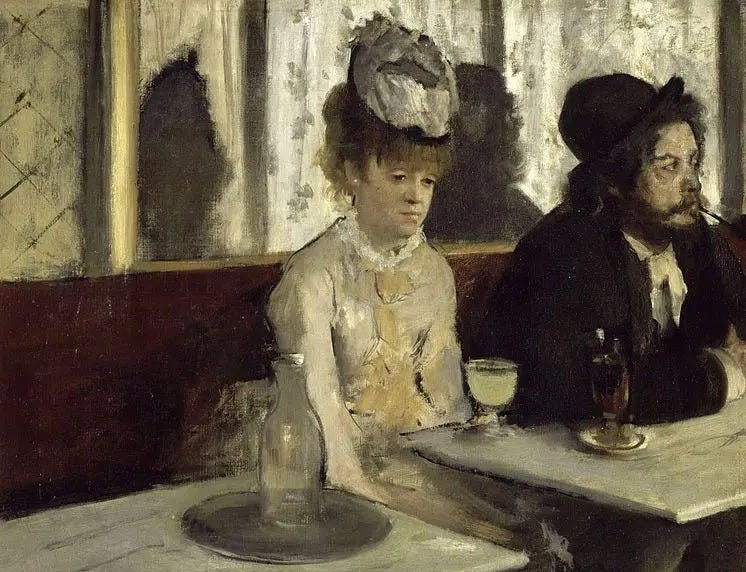Java and the Joyless Slumpers
The café, a once-vibrant stage for human encounter, has quietly transformed into an annex of the hunchback digital workplace. The murmur of voices has been replaced by the hum of devices charging.
“It’s a posture pandemic in here!” Patrick said, and the phrase landed with more truth than jest.
Not long ago, I found myself at Rough Draft, the little coffee shop in Hillsdale, Michigan, that has become something of a pilgrimage site for the college’s faithful. It’s a fine place. It has everything a classical soul might want: wood-paneled walls, the the smell of roasted beans, a random smattering of books stacked along the shelves, and a kind of studied seriousness that pairs well with strong espresso. Yet what struck me wasn’t the aroma of coffee or the hum of conversation. It was the absence of conversation altogether. Nearly every table was occupied, but every head was bowed—shoulders slumped, eyes fixed on the glowing screens of laptop and phone.
The café, which once hummed with conversation and the gentle chaos of community, had fallen silent. This cozy spot in Hillsdale, Michigan, is not an anomaly. Rough Draft has become, like so many cafés across the country, a temple of solitude in the age of connection. What was once a place of laughter, dialogue, and half-formed ideas traded over lattes has become a zone of isolation. The café, that once-vibrant stage for human encounter, has quietly transformed into an annex of the digital workplace. The murmur of voices has been replaced by the soft clicking of keyboards and the low mechanical hum of devices charging.
This is not, of course, unique to Hillsdale or Rough Draft. The same scene unfolds daily in cities and towns everywhere: bodies together but minds elsewhere. (My own neighborhood café is called Deeper Roots although Screener Snoots would be more apt.)
We have never been more “connected,” yet rarely do we look one another in the eye. The physical posture mirrors the spiritual one—heads bent, backs curved inward, hearts turned toward the little devices that promise the world but deliver only distraction and emptiness.
It is, quite literally, a posture pandemic.
Architecture and ritual once lifted our gaze upward. Churches, libraries, even cafés used to invite us to look across, to see and to speak. The traditional design of the café—small tables, ambient noise, the aroma of roasted beans—was once an architecture of encounter. It invited conversation. It formed community. It cultivated the kind of social intelligence and spontaneity that keep culture alive. But the glow of the screen has changed all that. Now we look down, alone in the crowd.
What’s been lost is a whole way of being human. The café was, in miniature, an image of the polis—a place where strangers might exchange ideas, where young lovers might fall in love, where a local poet might draft a line while listening to the laughter at the next table. In short, it was a place of communion. To see it reduced to a Wi-Fi hub is to glimpse, in a small but poignant way, the thinning of our common life.
The classical tradition of education insists that our formation is not only intellectual but physical and moral. How we sit, how we meet one another’s gaze, how we attend—all of it matters. When the body slumps, so does the soul. There is wisdom in posture, just as there is wisdom in the architecture that orients us toward what is noble and true. The posture pandemic is a crisis of presence.
Perhaps the cure begins with small acts of resistance. Put the phone face down, or better yet, out of sight. Meet a friend to see how her day or week or year is going. Sit upright as an act of moral readiness—the readiness to engage, to notice, to converse. The antidote to a posture pandemic is human recovery: the recovery of posture as a gesture of openness toward the world and toward one another.
Rough Draft may yet return to its name—a place where drafts, both written and spoken, are shared freely among friends. But it will not happen by accident. It will happen when we reclaim our spaces, and our very bodies, for the work of conversation and communion.
Patrick’s lament, then, is more than clever. It is diagnostic. Yes, it’s a posture pandemic in here, but perhaps naming the sickness is the first step toward health. The cure, as always, begins in the small and the ordinary: a shared table, a real conversation, a face turned toward another face.
Michael S. Rose, a leader in the classical education movement, is author of The Art of Being Human, Ugly As Sin and other books. His next book, The Subversive Art of a Classical Education, will be released by Regnery in January, 2026.




Thought provoking. Troubling but optimistic. Thank you!